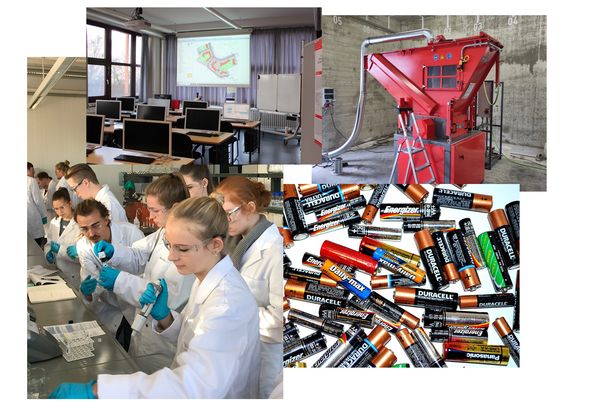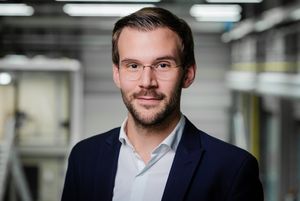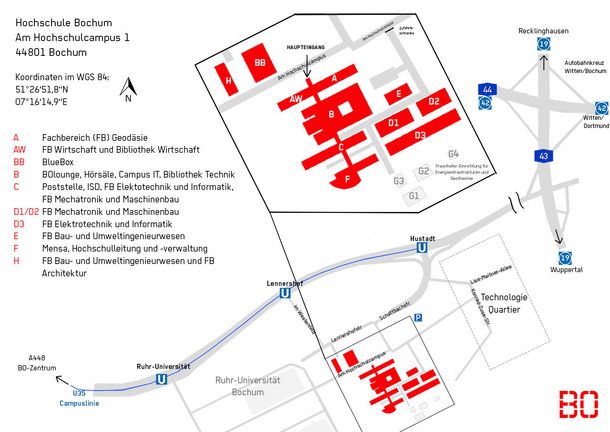Lehre im Urban Mining Institut
Das Urban Mining Institut ist fester Bestandteil der praxisorientierten Lehre an der Hochschule Bochum. Studierende wenden hier theoretisches Wissen aus dem Studium in realen Laborumgebungen an – sei es in betreuten Praktika, im Rahmen von Abschlussarbeiten oder bei wissenschaftlichen Studienprojekten im Bachelor oder Master. Die Bandbreite reicht von Grundlagenversuchen bis hin zur Mitarbeit an aktuellen Forschungsfragen.
Das Urban Mining Institut bietet Studierenden verschiedener Studiengänge die Möglichkeit, ihre Bachelor- oder Masterarbeiten mit praktischen Analysen (Laborausstattung), Versuchen oder Messreihen zu verbinden. Unterstützt werden unter anderem (aber nicht nur) Arbeiten aus den Studiengängen:
- Bauingenieurwesen (B.Sc. / M.Sc.)
- Umweltingenieurwesen (B.Sc. / M.Sc.)
- Nachhaltige Entwicklung (B.Sc. / M.Sc.)
- Angewandte Nachhaltigkeit (M.Sc.)
Aktuelle Ausschreibungen: Hier entlang
Abgeschlossene Abschlussarbeiten: Hier entlang
Im Master Bauingenieurwesen und Umweltingenieurwesen können im Urban Mining Institut wissenschaftliche Teilprojekte im Rahmen des Moduls Ingenieurwissenschaftliche Studien bearbeitet werden.
Dabei:
- werden eigene Versuchsaufbauten geplant, durchgeführt und ausgewertet
- erfolgt die Zusammenarbeit im Team mit enger Betreuung durch Laborpersonal und Lehrende
- werden Ergebnisse dokumentiert und im Rahmen des Projekts mündlich präsentiert
Aktuelle Ingenieurwissenschaftliche Studien:
Urban Mining Lab: Hier entlang
Darüber hinaus wird das Labor für begleitende Versuche, Analysen oder Methodenübungen in einer Vielzahl weiterer Lehrveranstaltungen eingesetzt – sowohl im Bachelor- als auch im Masterbereich. Dabei werden fachliche Inhalte aus der Wasserwirtschaft, Umweltanalytik, Ressourcentechnologie und Kreislaufwirtschaft praktisch vertieft.
Aktuelle Themen für Abschlussarbeiten
- Darstellung geologischer Aspekte in der Betrachtung des Ressourcenverbrauchs in der Ökobilanzierung
- Ammoniakgewinnung aus Zink-Kohle-Altbatterien
- Praktische Untersuchungen zum Einsatz von Altkunststoffen in sog. Plastic Roads
- Defossilisierung von Kupfer zur optimalen Einsparung von THG-Emissionen vor dem Hintergrund von Investitionsentscheidungen
- "Global Treatment Gaps and EPR Efficiencies in the Recycling of WEEE, Solar Panels, and Batteries”
- Legal framework study
- EPR legal status, statistics of recovery and recycling of the PV and batteries => China, EU, US, Japan (why is it not working in EU? How is it working in reality in China)?
- (focus on why targets are not met and what are practical implementation issues)
- Mapping of real treatment gaps
- Description of recoverable materials, non-recoverable materials, hazardous materials in WEEE categories
- Studying world capacities for actual recycling (recycling and smelting plants), for each of the WEEE categories and batteries as well as estimates of flows under Basel
- Detailed and specific procedures for selected WEEE types, for batteries for storage and export under Basel from country X
- Gap analysis in treatment infrastructure
- Global PV and battery EPR gaps and opportunities
- Description of recoverable materials, non-recoverable materials, hazardous materials in solar panels and batteries for renewable energy storage
- Studying world capacities for actual recycling (recycling and smelting plants), for each of the PV panels and batteries as well as estimates of flows under Basel
- Generation statistics (current and in 2030, 2050)
- Gap analysis in treatment infrastructure
- Evaluation of a solution to the EPR inefficiency for these streams combined with an infrastructure approach
- Legal framework study
- "Informal WEEE management formalization: how to make it fair in countries starting the EPR journey”
- Mapping formal-informal interface models
- Case study of integration models (India, Ghana, China): cooperatives, subcontracting, deposit buy-back, PRO-led schemes
- Stakeholder roles, risks, and operational bottlenecks in hybrid dismantling chains (maybe in country X as example)
- Cost analysis and externalities
- Collection and dismantling cost structures (informal vs formal), revenue from material recovery
- Material pricing, compliance cost (use location X as baseline)
- EPR fee allocation modeling
- EPR fee distribution options: per-kg subsidy, fixed handling fee, deposit-return mechanisms
- Simulation of cooperative and competitive models using material flow + cost assumptions
- Sensitivity analysis on scrap value, labor cost, and compliance thresholds
- Integration viability scenarios
- Financial break-even point for informal cooperatives vs SME processors under various fee schemes
- Policy and infrastructure adjustments needed to operationalize cooperation
- Feasibility conclusions for just transition policy design in the WEEE sector
- Mapping formal-informal interface models
Weitere Themen auf Anfrage!




